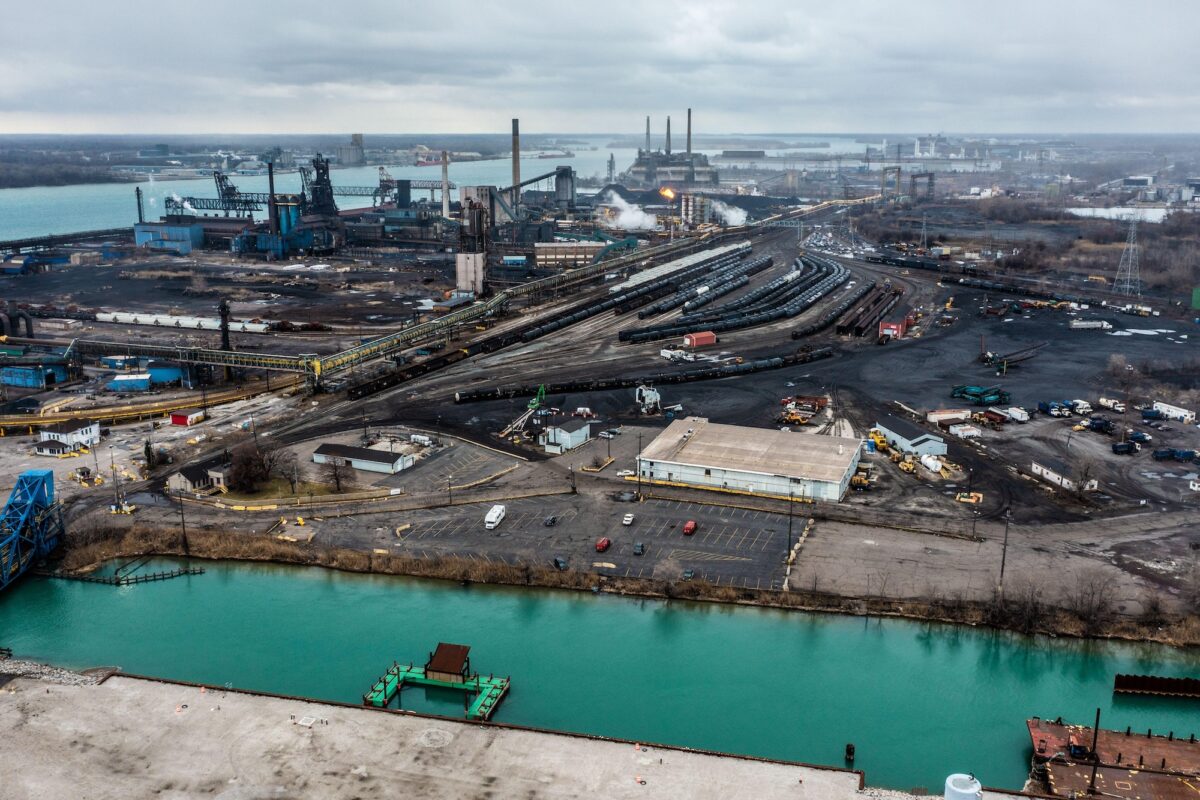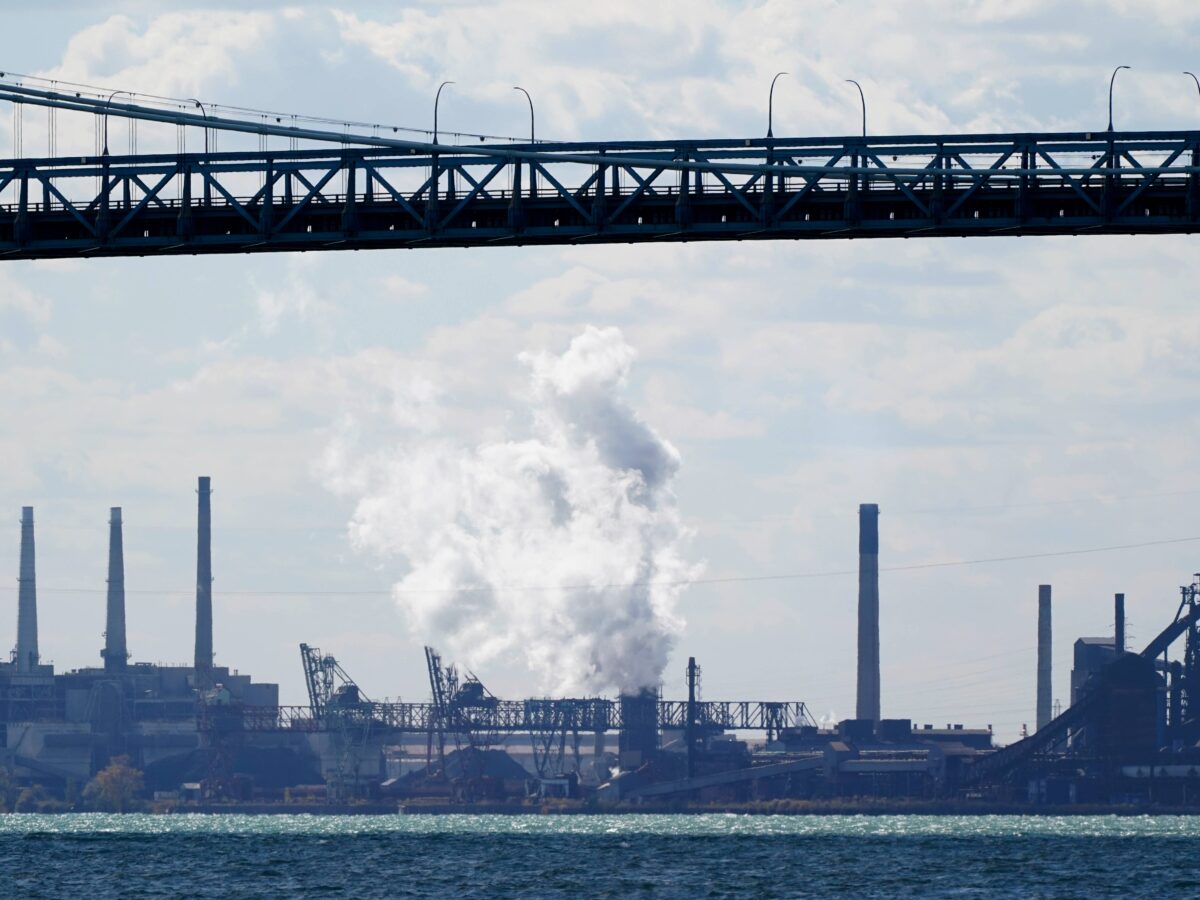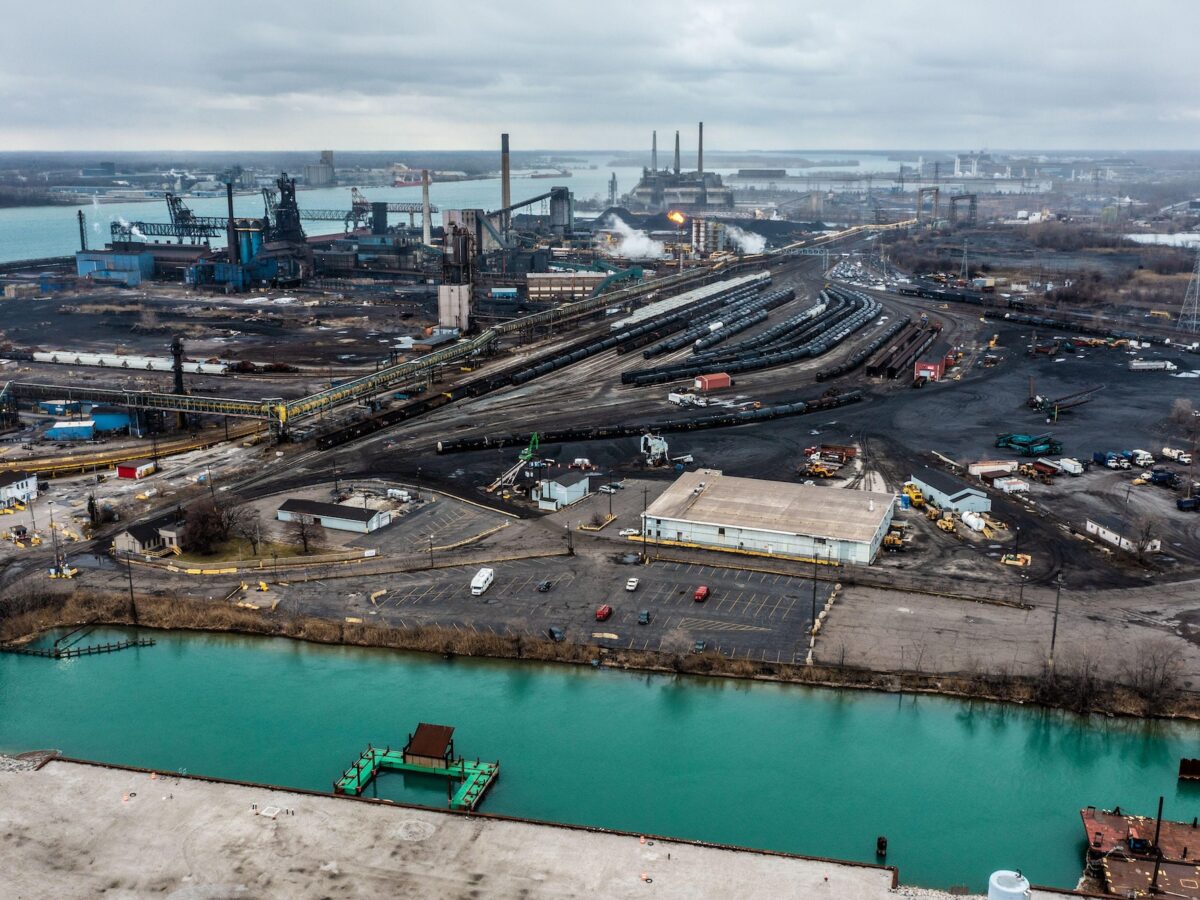Overview:
-Michigan regulators approve air quality permit for secondary coke screener at EES Coke Battery on Zug Island.
-The facility is the subject of an EPA lawsuit and state environmental violation notices.
-EES Coke Battery is seeking an exemption from Clean Air Act rules from the Trump administration.
Michigan regulators approved an air quality permit Wednesday for a secondary coke screener at DTE Energy’s EES Coke facility on Zug Island that could bring additional pollution to Downriver and Southwest Detroit.
EES Coke Battery received a new state environmental violation notice eight days prior to the permit approval and is the subject of an EPA lawsuit. The facility, owned by the electric utility’s DTE Vantage subsidiary, produces coke for the steel industry.
At a public meeting in February, Jenifer Dixon, planning and policy coordinator for the Michigan Department of Environment, Great Lakes, and Energy Air Quality Division, said the coke screener would improve EES Coke’s existing operations.
Coke is produced by heating coal in an oxygen-free environment. The screener separates coke by size so that it can be used to heat iron ore as part of the steelmaking process.
EES Coke will take over the screening process from a contractor on another part of Zug Island and move it indoors, which could better control pollution, Dixon said.
Both EES Coke and the third-party company continue to have valid permits and could operate going forward, potentially increasing the total pollution from coke screening on the industrialized island, EGLE said in response to comments made during the permitting process.
The new screener will emit 1.6 tons of particulate matter, 0.82 tons of PM10 and 0.23 tons of fine particulate matter, or PM 2.5, per year, according to an EGLE fact sheet.
If the project emitted 10 tons or more per year of fine particulate matter, it would be subject to regulations on Prevention of Significant Deterioration and Nonattainment New Source Review, the fact sheet said.
Earlier this year, EGLE said Wayne County exceeds the new federal standard for PM 2.5.
PM 2.5 is 30times smaller than the width of a human hair and can lodge itself in lung cells and move into the bloodstream, according to the Environmental Protection Agency. It’s linked to cardiopulmonary illness, premature mortality, aggravated asthma, and other health issues.
The permit that was approved does not represent an expansion of the EES Coke Battery facility, EES Coke Battery Vice President David Smith said in a statement to Planet Detroit.
“It requests the installation of a secondary screener operated within an enclosed building and using foam suppressant to prevent particulate from becoming airborne,” he said.
“This new equipment is planned to perform in-plant screening of a portion of the product that is currently processed at a different location, thereby reducing emissions from transportation.”
The facility has “complied with all regulations governing the site at the state and federal level that protect public health,” Smith said, adding that EES Coke Battery supplies the steel industry and supports more than 170 jobs.
EGLE said it made the following changes to the permit based on public comment: requirements for the conveyors to be covered; and specific locations where non-certified visible emission readings must be taken outside the screening process.
Zug Island facility faces EPA lawsuit, new state violation
The permit approval comes as DTE and EES Coke face an ongoing lawsuit filed by the Environmental Protection Agency over federal Clean Air Act Violations.
The Zug Island facility has racked up numerous EGLE violations in recent years, according to the agency’s website. The most recent state environmental violation notice issued June 3 is for exceeding visible emission limits.
In May, Planet Detroit reported that EES Coke is seeking an exemption from Clean Air Act rules from the Trump administration, which could provide the company with an extension for meeting certain air quality standards.
EES Coke contributes to an estimated 29-57 premature deaths and 15,387 cases of asthma a year, according to a 2024 study from Industrious Labs, a research and advocacy organization.
Environmental lawyer opposes use of Significant Impact Levels
Andrew Bashi, staff attorney at the Great Lakes Environmental Law Center, criticized EGLE’s use of “Significant Impact Levels” in the permitting process to show that granting the permit would have a minimal effect on air quality.
Environmental regulators use SILs to measure whether a facility’s pollution levels are small enough that they won’t significantly affect the air people breathe.
EGLE spokesperson Josef Greenberg previously told Planet Detroit that permits could still be issued using SILs for PM 2.5 even if Wayne County is federally designated as being in “nonattainment” for PM 2.5, meaning it has failed to meet federal air quality standards for the pollutant.
Bashi said widespread use of SILs by regulators could make it impossible to bring the area into compliance with federal air quality standards.
“If they can do this here, what’s going to stop them from doing 100 more just like it?”
MORE REPORTING FROM PLANET DETROIT
State regulator asks EPA to redesignate Wayne County’s compliance with sulfur dioxide standards
The EPA will review the request and decide whether it meets Clean Air Act requirements, and the federal agency has 18 months to approve or deny the request
EPA offers Clean Air Act exemptions from Trump, and one of metro Detroit’s top polluters applies
A new EPA policy under the Trump administration could let over 500 facilities nationwide sidestep pollution controls for two years, a move that critics say endangers millions of Americans.
‘We don’t take breathing for granted’: Residents tell regulators to deny DTE’s Zug Island permit
Advocates and residents say EGLE should consider cumulative pollution impacts and block a permit for DTE’s EES Coke facility, which could worsen air quality in southwest Detroit and Downriver
EGLE has authority to block permits, advocates say
Bashi said EGLE’s use of significant impact levels may lead to a legal challenge to the permitting decision. He previously told Planet Detroit that any additional PM 2.5 pollution in an area already exceeding the National Ambient Air Quality Standard for the pollutant would contribute to exceedances.
“All they’re doing is finding new ways to add additional pollution, despite the fact that we’re way beyond these health-based standards.”
Bryan Smigielski, Michigan campaign organizer for the Sierra Club, told Planet Detroit the national ambient air quality standards “don’t capture the neighborhood’s mix of poverty, chronic disease, and long-term industrial exposure.”
EGLE’s Rules 901 and Rule 228 empower the agency to do more to limit emissions and protect overburdened communities from pollution impacts, but regulators have declined to exercise this authority, he said.
“Community advocates are not asking for moon-shot technology or extreme oversight,” Smigielski said. “They want EGLE to use the rulebook it already has.”





